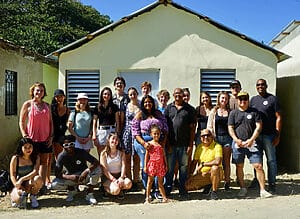Operations update on École L’Union
The levels of violence and unrest in Haiti over the past few months have reached critical heights, and we have been working diligently with parents, teachers and community members to safely re-open École L’Union.
While the majority of unrest in Haiti is in the South near the capital city of Port-au-Prince, there were looming concerns of protest activities growing in the North as well. But one of the main impacts on École L’Union was that fuel was completely unavailable, which greatly affected operations.
After much deliberation, we’re pleased to say that as of Monday, Dec. 5, students have returned to school. But the situation in Haiti continues to be unsettling. The safety of our students and staff is always our top priority, and we will continue to monitor the situation as things progress. Right now, we are preparing students as best we can with a modified lesson plan to ensure they are able to effectively complete their academic year and receive the quality education they so rightly deserve.
“Haitian students are being denied their basic right to education due to political and economic unrest. Studies show that when children are not in school, the level of hunger and violence within the families rises. When they are in school, they at least have a daily hot meal and people to care for them, so we’re happy to have students back in class.”
Michelle Guillaume, Manager of Operations in Haiti
Haiti is currently experiencing protests, civil unrest, armed gang violence, a cholera outbreak, and shortages of fuel, food and clean drinking water. We were hoping to return to École L’Union at the beginning of the term in September 2022, but during this time, two things happened: The Minister of Education postponed school openings until Oct. 3, and the acting Prime Minister, Ariel Henry, announced that the Haitian government would be ending fuel subsidies, causing the price of fuel to increase by three times its normal amount. This led to protests, and riots and blocked roads.
In this crisis atmosphere, parents and families did not feel safe sending their children to school, with dozens of gangs increasing and rising acts of violence throughout the country. Because of this, the reopening date for school would be pushed back even further. While some of Haiti’s wealthiest families were able to switch to online learning, this was not possible in vulnerable communities that simply do not have the resources, such as Calvaire. As a result, our team has had many meetings with parents and teachers over the past few months to consider several reopening plans that would give our students safe access to education.
Many of our staff and students at École L’Union were able to return full-time in December. Rest assured that we will continue to act in their best interests. We are confident that we are operating by the safest means possible and that we will be able to recover from the time lost during the academic year.
We will continue to follow the situation in Haiti via news outlets, but most importantly, via our staff team on the ground in Haiti.


